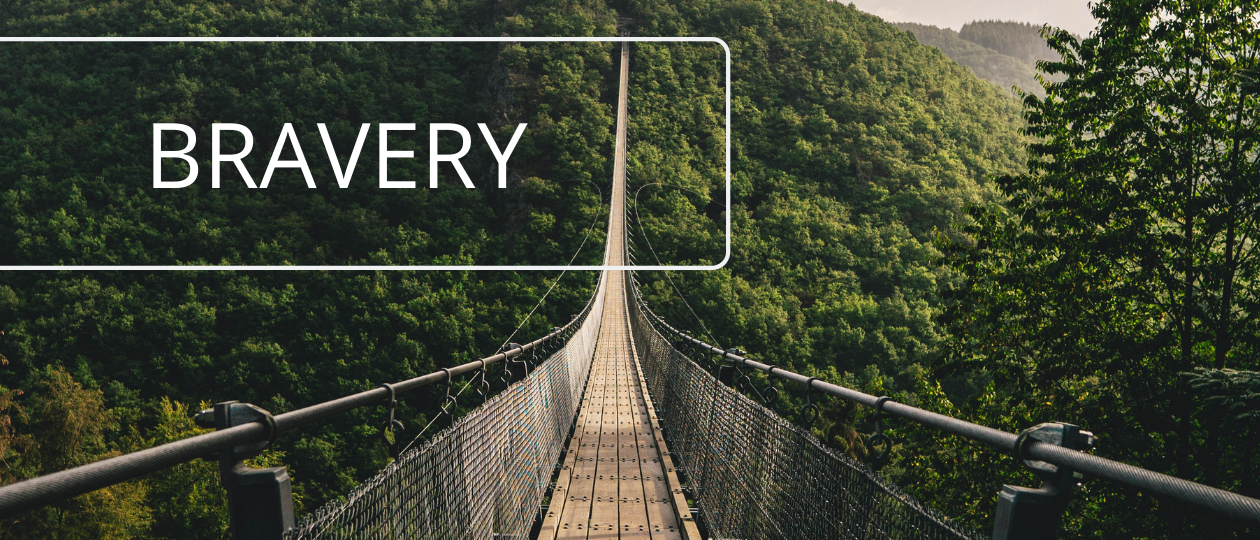No one wants to be brave
There’s a passage in an ancient manuscript that instructs us to count it as joy when we experience suffering. It seems totally backwards, doesn’t it? I can tell you from experience that even those who try to live by these manuscripts have trouble getter their heads around that bit, even after years and years.
I have a pair of short thoughts for you today, and the first of them is this: no one wants to be brave.
Now, on the one hand, everyone admires bravery in others. But the trouble is that bravery means doing what we believe in spite of adversity—and especially fear. Most of us don’t like adversity, and none of us like to be afraid. Yet you can be sure that life will present you with plenty of both, and so bravery becomes necessary.
The brilliant psychiatrist, M. Scott Peck wrote that few achieve their best lives because one of the stages you have to go through to find it is chaos—which means change and pain. In other words, they encounter a period of fear and turn back. If you’ve ever seen someone who seems to live each day with bravery, never letting fear overwhelm them and stepping forward into new adventures with confidence, it’s a sight to make you envious. I believe that the greatest challenge of life is a contest between fear and love, so clearly, bravery to overcome that fear is important. But you hardly ever hear anything about how to become brave. It seems like people assume bravery is something that you either have or do not. I don’t claim to have all the answers to that, but I’ll leave you with something that may help.
One of my greatest heroes is a Jewish holocaust survivor named Victor Frankl, who actually went on to become a psychiatrist and write books where he used his experiences there to help others. When he was asked how he coped with the nightmarish conditions that caused so many of his fellows to fall into despair, he said that he exercised the last of human freedoms, which is the ability to choose his internal state in any situation. No matter how bad the circumstances, and no matter what his captors did to him, they could not take that away.
Although I hope none of us will ever know circumstances as terrible as his, every one of us has this same freedom at our disposal, and that is a comforting thought.
The second one I have for you today is about what I call “unconscious selfishness.” So what does that mean? Well, think back to a time when you’ve seen someone overreact to a minor annoyance or discomfort. You can probably recall at least a few times when you’ve done that yourself, but ask yourself this: at that moment, did you really even know why you were doing it? Maybe you got angry with a family member over some irritating behavior, even though you knew they weren’t doing it on purpose. Maybe you felt a little bit of road rage during traffic one day, even though no one around you was to blame. But you find yourself getting angry anyway. Why?
Well, I call it unconscious selfishness for a reason. Because whether you’re aware of what you’re doing or not, the source of this type of issue is always beneath the surface. Essentially, I believe it’s the result of an automatic defense mechanism trying to protect us from getting hurt, which usually starts with a false memory. Not necessarily that the events we remember didn’t happen, but that our interpretation of them is wrong. For example, I had a false memory for many years of my dad beating me and telling me I’ll never amount to anything. Did that happen? Yes, it did. The error was in believing his words, and thinking that because of what he said and did, I can never amount to anything when the reality is that he was under a lot of pressure and had just gotten some very bad medical news, and he simply snapped.
This week, I urge you to keep a close watch for unconscious selfishness, especially in yourself. It’s not usually too hard to spot if you’re willing, to be honest with yourself. If you do find anything, use Trilogy, use Memory Engineering, and bring yourself back to a place of truth and peace.
Have a blessed, wonderful day!
Alex Loyd




Add a Comment